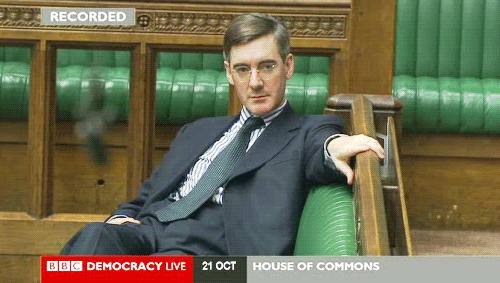This morning Jacob Rees-Mogg made his debut on glossy Good Morning Britain, amongst claims that he could be on course to become the next Prime Minister against a backdrop of Teresa May's dwindling authority from her seething Tory party. Rendering even the brash arrogance of Piers Morgan speechless, he boldly defended his opinion on abortion and same-sex marriage, which in a country where these acts have been fought with tooth and nail to become unspoken freedoms protected by law, were a rather shocking, if not predictable, admission from the infamous Tory MP.
JRM, lovingly nick-named "moggy" by many of his cult following, is just the latest political personality to be propelled into a pop-culture movement with its own shiny #moggmentum hashtag. Further proof of his cult appeal comes as 25,000+ people have apparently signed up to Ready For Rees-Mogg which appears to be a campaign website to "lead the Conservative fightback and reignite Britain’s promise." Whatever that means.
Whilst I find his views on female reproductive rights and LGBT laws are completely juxtaposed with the average voters' actual opinion, you can't deny that Rees-Mogg a fascinating sort of character. The absolute embodiment of upper class, austerity dodging, southern British culture, from his staple single buttoned 1920's tailored suit to his milkbottle spectacles, the Conservative member for North East Somerset feels like more of a caricature of what Americans think British people are like, than an actual person. In fact, a basic pen sketch of JRM would probably make more sense to me than the man himself. His drawl tone delivers witty quips which delight the traditionalist moderate- right factions of society, who have been emboldened by the Brexit vote - and Rees-Mogg could be just the poster boy for a good-old-days-but-brand-new-sovereign Britain.
However it increasingly feels like our political races and elections are being infiltrated with cult personalities and shaped by activism movements. The rise of Rees-Mogg could potentially provide a right-wing mirror of the breakthrough performance executed by Jeremy Corbyn and Momentum in the 2015 Labour leadership race.
From the naked eye, Corbyn and Rees-Mogg are chalk and cheese every aspect, however their rise to popularity is rooted in similar characteristics. Neither have held a cabinet position, nor ministerial role, both instead choosing to sit on the back benches of the commons and rebel against party whips. This itself would point to why they could garner a cult following throughout their career; political figures who are outspoken and stubborn, albeit with no actual responsibility to deliver change, cannot be a target for anger at the government because they are "outsiders". By providing criticism to the gristle of elected governance, they are the underdog, the stick in the mud, who are sticking up for the average joe. This is welcome contrast to the flighty fairweather opinions of many a plucky, youthful career politician who are willowly, bending their words to whatever the crowd wants to hear.
But what is it about JC and JRM that enables them to garner such a cult following anway? Its a unique sort of phenomenon that seems to be growing, where someone considered to be unpopular and strange in comparison to mainstream standards, is recognized, mocked, then loved, and crowned as an "anti-hero" by the internet. It often feels tinged with irony and sarcasm, with fast-evolving memes directing the narrative. This combined with the general disenfranchisement of neoliberal policy and the democratic process of our current UK political landscape, provides the optimum conditions for steadfast characters to come out of the woodwork of the House of Commons, and be snatched up by those on the fringes of both political parties.
The leading force behind both the Moggmentum and Momentum movements, more surprisingly in the case of the latter, are young people; which is probably how both unknown politicians were able to garner such an unofficial, viral digital campaign. Historically though, young people don't bother to vote- although this years' election bucked the trend in terms of youth turnout and probably saved Labour from absolute misery. So there might just be legs in this cult leader thing, maybe just not enough to actually generate appeal from undecided voters, which is really the key to success of any electoral campaign.
Charisma has always been a hallmark of any popular leader, but even more so in a culture where personality is expected to be more like a "brand". This ultimately failed for Teresa 'strong and stable' May in the General Election, however in the case of Corbyn and Rees-Mogg, the appetite of the general public for their actual tenure as position of Prime Minister is yet to be proven. The most iconic phrase to come out of the Brexit debate was "Britain has had enough of experts", and its increasingly becoming true for the political leaders we regard as potential Prime Ministers.



No comments
Post a Comment
Thank you for your comment! I'll get back to you shortly.